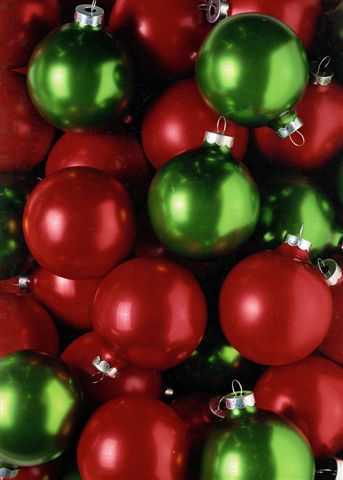 The rich and festive hues of traditional Christmas decorations—-the reds, greens, golds and silvers—-run deep in our culture. Who wants Christmas in black and white? A closer look at the familiar Yuletide colors coaxes a beautiful story into the open, making the season even more meaningful. Moreover, the Bible dedicates much print to the meaning of colors. They signify spiritual concepts in a non-verbal way that brings an emotional response to the words and doctrines of God’s word.
The rich and festive hues of traditional Christmas decorations—-the reds, greens, golds and silvers—-run deep in our culture. Who wants Christmas in black and white? A closer look at the familiar Yuletide colors coaxes a beautiful story into the open, making the season even more meaningful. Moreover, the Bible dedicates much print to the meaning of colors. They signify spiritual concepts in a non-verbal way that brings an emotional response to the words and doctrines of God’s word.
Red: Red reflects our warmth and love for God, the world and each other. It is the color that we consider the most exciting. As a religious symbol it stands for fire, blood, and charity. We can envision the fire of Pentecost by seeing the color of red. We can commemorate the shed blood of Christ which atones for our sins in using red. We can exult in the expression of divine love that brought about salvation when we weave red into our décor. The holly berries and poinsettias are two winter plants traditionally used as Christmas decorations.
Green: The color green depicts hope and speaks of the eternal longing for spring and all the promises of the future. In green, we see nature, youth, and the hope of eternal life. For this reason, Christmas is a feast of hope, featuring a newborn child as its central symbol. No motif embodies the source of life any more than the incarnation of God in Christ Jesus. The breath of life filled the earth when Mary’s baby began to cry. In particular, we celebrate the new birth experience in Christmas, as well as the birth of Christ. Holly, pine trees, ivy, mistletoe are all plants closely associated with the life of Christmas.
White: White means purity and is represented by the crystalline form of water and the snowflake. White symbolizes light, purity, joy and glory. When Jesus entered the world, absolute perfection and sinlessness took on a human form. Pure love, pure truth and pure holiness are all seen in the white color of Christmas. White is seen in the robes of Christmas angels, as well as in Christmas snow and snow flakes.
Gold: The color gold is a warm color that can be bright and cheerful as well as somber and traditional. Because gold is a precious metal, we associate it with wealth and prosperity. Those familiar with the Bible recognize that gold symbolizes the deity of Christ. If fact, the offering of gold by the wise men strongly conveys the message that Jesus is more than the savior of the world, he is the very God who created the world.
Silver : As a color, silver is thought of in the cool range. Although it lacks the warmth of gold, it still signifies wealth. Silver has a greater practical usefulness than gold, and finds its way to fine tables in the form of silverware, bowls and flasks. Jesus made the riches of God’s grace accessible to us all when he came in the form of man to die for our sins. Silver is also the price of redemption, because Judas sold the savior for thirty pieces of silver.
Blue : Color experts tell us that a blue or azure conveys richness and may intimate superiority. The craftsmen who built and furnished the tabernacle used the color blue extensively in the curtains, veils and tablecloths. They also wove blue loops and lace into the special garments of the priests. Blue is the background for the angelic choir and the star of Bethlehem . The color of the sky and of the seas, blue suggests the eternal nature and the omnipotence of God. There is only one naturally occurring blue food: blueberries, even as there is only one who personifies God in this world, the Lord Jesus Christ.
Lavish use of color put liveliness and excitement into the celebration of our savior’s birth. God is not drab; he loves color. The covenant rainbow, Joseph’s coat and the panoply of colors that carpets the earth provides all the evidence we need to make the case. Every color we use puts some aspect of God’s nature, glory and grace on display for the world. “For in him dwelleth all the fullness…” (Some color meanings adapted from www.about.com)